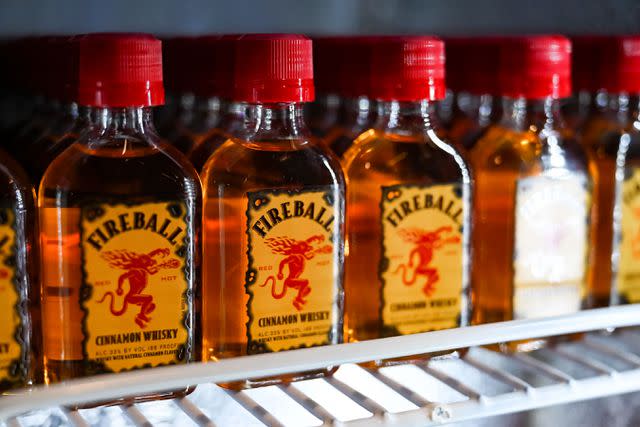FYI, Those Mini Bottles of Fireball Sold at Gas Stations Aren't Actually Whiskey
...and people are mad enough to sue.
In April 2021, a columnist for the Albany-based newspaper, The Times Union, wrote that liquor store owners were “pissed” that supermarkets, convenience stores, and gas stations had started stocking mini-bottles of Fireball — despite the fact that in New York state, only liquor stores are allowed to sell spirits. But that’s because what was selling in gas stations isn’t actually Fireball at all.

David Becker / Getty Images
As writer Steve Barnes explained, those single-serving bottles, which often retail for under a dollar, are called Fireball Cinnamon, and they aren’t the same product as Fireball Cinnamon Whisky. The difference between the two drinks is that Fireball Cinnamon is actually a malt-based beverage with 16.5% alcohol by volume (ABV), while Fireball Cinnamon Whisky is whisky-based and has an ABV of 33%. “The labels look almost identical,” he wrote. “That is intentional.”
Those two beverages — and their similar-looking labels — are now the subject of a class-action lawsuit. Lead plaintiff Anna Marquez has sued Sazerac Company, Inc, which makes and markets Fireball. According to her legal filing, Marquez saw a “huge” display of Fireball Cinnamon at a gas station and wondered if the station was “doing something they’re not supposed to be doing.”
:This Whiskey Is Made From Crabs
The Washington Post reported, the basis of Marquez’s lawsuit is that those little bottles of Fireball Cinnamon are misleading because of the products’ branding and the wording on the label. The legal filing notes that the “bottles appear identical but for the word ‘Whisky’ on the front label” and that Fireball Cinnamon’s label describes it as a “Malt Beverage with Natural Whisky & Other Flavors and Caramel Color.”
“Using the words ‘With Natural Whisky & Other Flavors’ is a clever turn of phrase because consumers who strain to read this will [not] see how it [sic] ‘Natural Whisky’ is distinct from ‘Other Flavors,’” the lawsuit reads. “They will think the product is a malt beverage with added natural whisky and other flavors. What the label means to say is that the product contains ‘Natural Whisky Flavors & Other Flavors,’ but by not including the word ‘Flavors’ after ‘Natural Whisky,’ purchasers who look closely will expect the distilled spirit of whisky was added as a separate ingredient.”
As a result, the lawsuit says that Marquez is “unable to rely on the labeling of not only this product but other flavored malt beverages which use the names of distilled spirits.” (That line may be a reference to another of Sazerac’s malt-based beverages, the 20% ABV version of Southern Comfort.) The lawsuit is seeking “unspecified statutory and punitive damages” for anyone in Alaska, Arizona, Arkansas, Idaho, Illinois, Iowa, Kansas, Mississippi, North Dakota, South Carolina, Utah, or Wyoming who has purchased Fireball Cinnamon.
In the FAQ section of the Fireball website, Sazerac describes Fireball Cinnamon as “malt-based [...] alcoholic beverages that are made using our proprietary recipe, capturing the essence of the Fireball taste experience consumers love.” And in response to a question about how one can tell Fireball Cinnamon from Fireball Cinnamon Whisky, the company says that Fireball Cinnamon can be recognized by “the words Fireball Cinnamon on the front label, without ‘Whisky’.” Whether or not that’s enough of a distinction may be up to the courts to decide.

